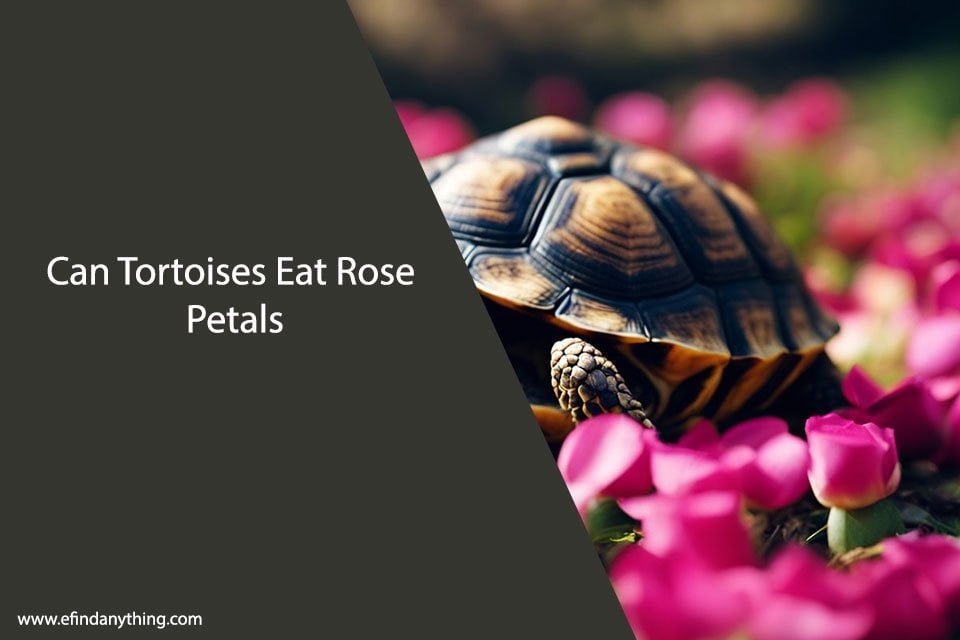Tortoises are known for their herbivorous diets, but not all plants are safe for them to consume. One question that often arises is whether tortoises can eat rose petals. As tortoise owners, we want to ensure that our pets are getting the proper nutrition they need to stay healthy and thrive. In this article, we will explore the question of whether tortoises can safely consume rose petals.
Rose petals are often used in various culinary and medicinal applications, but are they safe for tortoises to eat? While roses are not toxic to tortoises, it’s important to note that they should only be given in moderation. Consuming too many rose petals can lead to digestive issues, including diarrhea. Additionally, rose petals should only be given if they are free from pesticides and other harmful chemicals.
As with any new food item, it’s important to introduce rose petals slowly and in small amounts to monitor your tortoise’s reaction. While some tortoises may enjoy the taste of rose petals, others may not be interested in them at all. As responsible tortoise owners, we should always do our research and consult with a veterinarian before introducing any new food items to our pets’ diets.
Table of Contents
Understanding Tortoises’ Diet
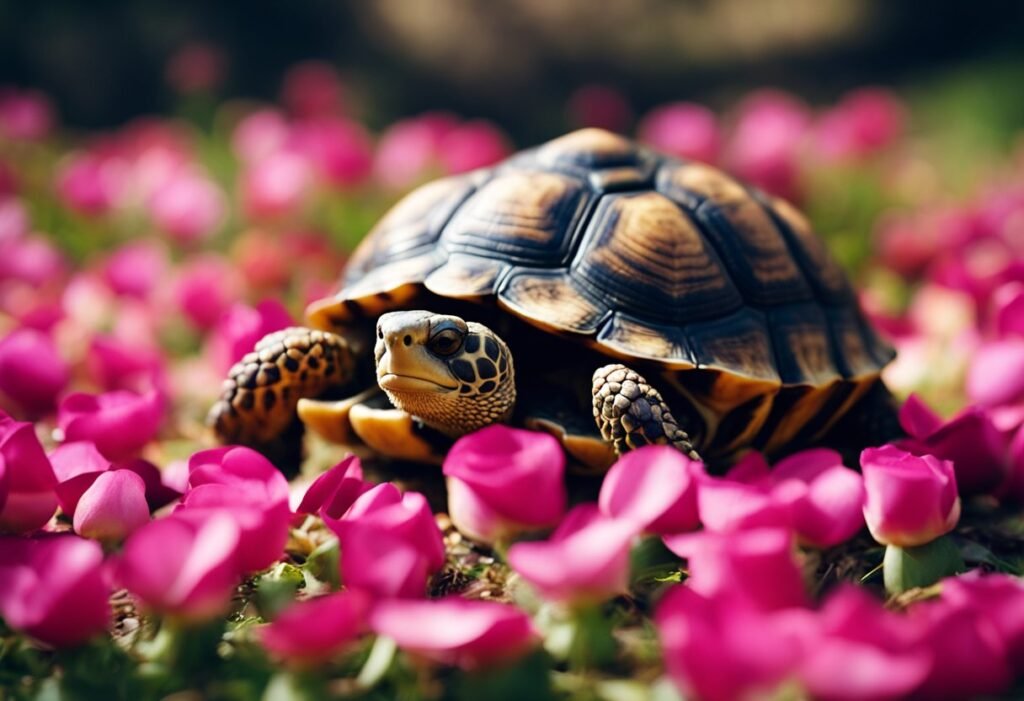
Tortoises are herbivorous reptiles that feed mostly on vegetation. In the wild, they have a varied diet that includes grasses, leaves, flowers, and fruits. However, not all plants are suitable for tortoises, and some can be harmful to their health. In this section, we will discuss the general diet of tortoises and their preferred foods.
General Diet
Tortoises need a diet that is high in fiber and low in protein and fat. A diet that is too high in protein and fat can lead to health problems such as kidney failure and shell deformities. The general diet of tortoises should consist of the following:
- Grasses: Tortoises need a lot of fiber in their diet, and grasses are an excellent source of it. They also provide a good source of calcium and other essential nutrients.
- Leaves: Tortoises love to eat leaves, and they are an excellent source of vitamins and minerals. However, not all leaves are suitable for tortoises, and some can be toxic. It’s important to research which leaves are safe for your tortoise to eat.
- Flowers: Tortoises enjoy eating flowers, and they provide a good source of vitamins and minerals. However, not all flowers are safe for tortoises, and some can be toxic. It’s essential to research which flowers are safe for your tortoise to eat.
- Fruits: Tortoises enjoy eating fruits, but they should be given in moderation as they are high in sugar. Fruits such as strawberries, raspberries, and melons are suitable for tortoises.
Preferred Foods
While tortoises can eat a variety of plants, they do have some preferred foods. These include:
- Dandelions: Tortoises love to eat dandelions, and they are an excellent source of vitamins and minerals.
- Hibiscus: Hibiscus flowers are a favorite of tortoises, and they provide a good source of vitamin C.
- Mulberry leaves: Mulberry leaves are a favorite of tortoises, and they provide a good source of calcium.
- Prickly pear cactus: Tortoises enjoy eating the pads and fruit of the prickly pear cactus, and they provide a good source of fiber and water.
In conclusion, tortoises need a varied diet that is high in fiber and low in protein and fat. Grasses, leaves, flowers, and fruits are all suitable for tortoises, but it’s important to research which plants are safe for your tortoise to eat. Tortoises have some preferred foods, including dandelions, hibiscus, mulberry leaves, and prickly pear cactus.
Can Tortoises Eat Rose Petals
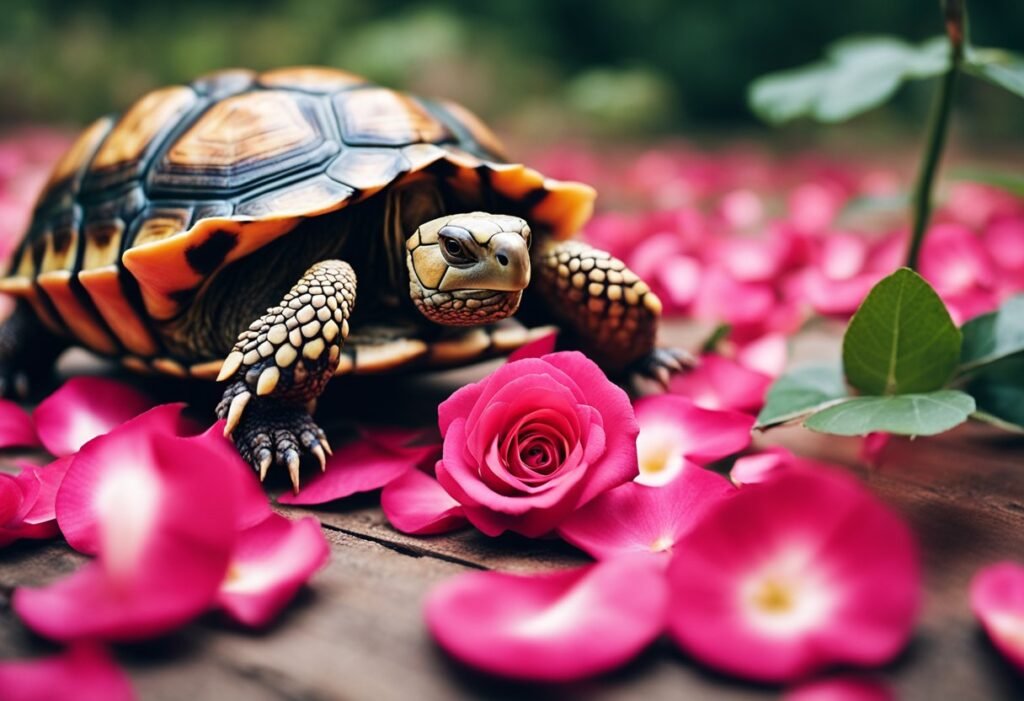
When it comes to feeding our tortoises, we want to make sure we are providing them with a balanced and healthy diet. One question that often arises is whether or not tortoises can eat rose petals. In this section, we will explore the health benefits and potential risks of feeding rose petals to tortoises.
Health Benefits
Rose petals are a good source of vitamin C, which is important for the immune system and overall health of tortoises. They also contain antioxidants, which can help protect against cell damage and reduce inflammation. Additionally, rose petals are a good source of fiber, which can help promote healthy digestion.
Potential Risks
While rose petals can provide some health benefits, there are also potential risks to consider. First, it is important to make sure the rose petals are free from pesticides and other chemicals, as these can be harmful to tortoises. Additionally, rose petals are high in oxalates, which can bind to calcium and prevent its absorption. This can lead to metabolic bone disease in tortoises if fed in excess.
In conclusion, while rose petals can provide some health benefits to tortoises, it is important to feed them in moderation and ensure they are free from harmful chemicals. As always, it is best to consult with a veterinarian or reptile specialist before introducing any new foods to your tortoise’s diet.
How to Feed Rose Petals to Tortoises
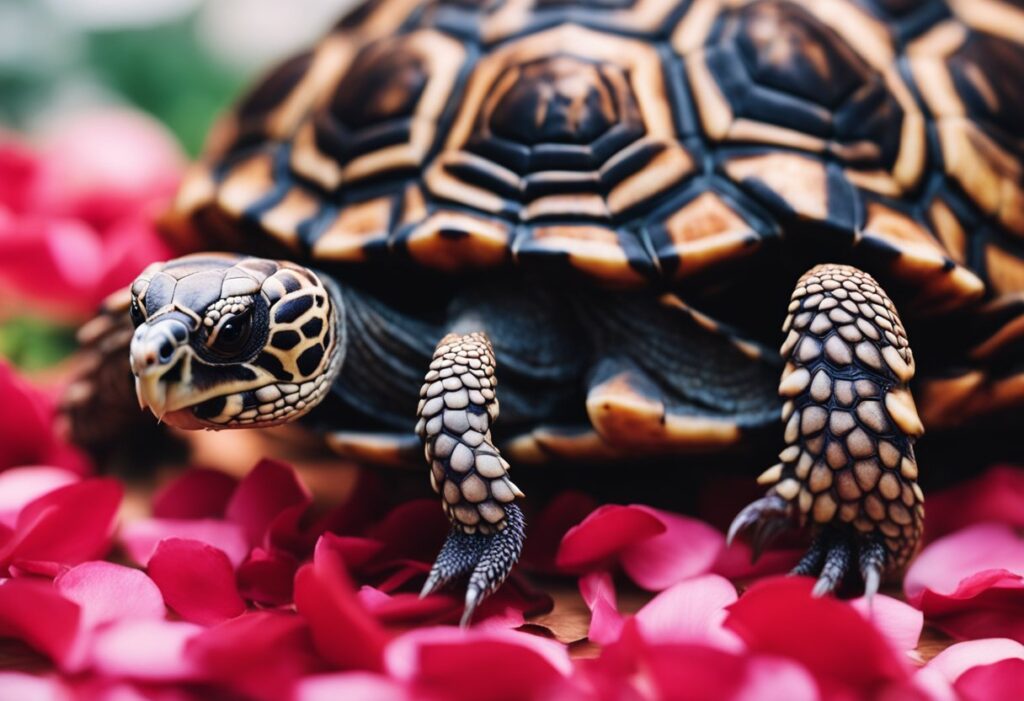
Feeding rose petals to tortoises can be a healthy and nutritious addition to their diet. However, it’s important to follow some guidelines to ensure that your tortoise is getting the most out of this treat.
Firstly, it’s important to select the right type of rose. Organic, unsprayed roses are the best option, as they are free from harmful chemicals. It’s also important to avoid roses that have been treated with pesticides or other chemicals.
Before feeding the rose petals to your tortoise, make sure to rinse them thoroughly to remove any dirt or debris. You can also remove the white base of the petal, as this can be tough and difficult for your tortoise to digest.
When feeding rose petals to your tortoise, it’s important to do so in moderation. While they are a healthy treat, they should not make up a significant portion of your tortoise’s diet. Aim to feed your tortoise a few petals once or twice a week.
Finally, it’s important to monitor your tortoise’s reaction to the rose petals. While most tortoises will enjoy this treat, some may have an adverse reaction. If you notice any signs of illness or discomfort, stop feeding rose petals immediately and contact your veterinarian.
By following these guidelines, you can safely and effectively incorporate rose petals into your tortoise’s diet.
Other Flowers Tortoises Can Eat
Aside from rose petals, there are other flowers that tortoises can safely consume. Here are some examples:
- Hibiscus: This flower is high in vitamin C and antioxidants. It also contains calcium and other minerals that are beneficial to tortoises.
- Dandelions: Not only are dandelions safe for tortoises to eat, but they are also packed with nutrients. They contain vitamins A, C, and K, as well as calcium, iron, and potassium.
- Marigolds: These flowers are a good source of antioxidants and can help boost a tortoise’s immune system. They also contain vitamins A and C.
- Nasturtiums: Nasturtiums are a great source of vitamin C and can help prevent infections and illnesses. They also contain minerals like iron and magnesium.
It’s important to note that while these flowers are safe for tortoises to eat, they should still be given in moderation. Too much of any one type of food can upset a tortoise’s digestive system. Additionally, it’s important to ensure that any flowers given to tortoises are free of pesticides or other harmful chemicals.
Conclusion
In conclusion, while tortoises can eat a variety of foods, including fruits, vegetables, and some flowers, it is important to be cautious when feeding them rose petals. While they are not toxic, they do not provide any nutritional value and can potentially cause digestive issues if consumed in large quantities.
It is recommended to only offer rose petals as an occasional treat, and to ensure that they are pesticide-free and thoroughly washed before feeding them to your tortoise.
Overall, it is important to provide a balanced and varied diet for your tortoise, and to consult with a veterinarian or reptile specialist if you have any concerns about their diet or health. By following these guidelines, you can ensure that your tortoise stays healthy and happy for years to come.
Frequently Asked Questions
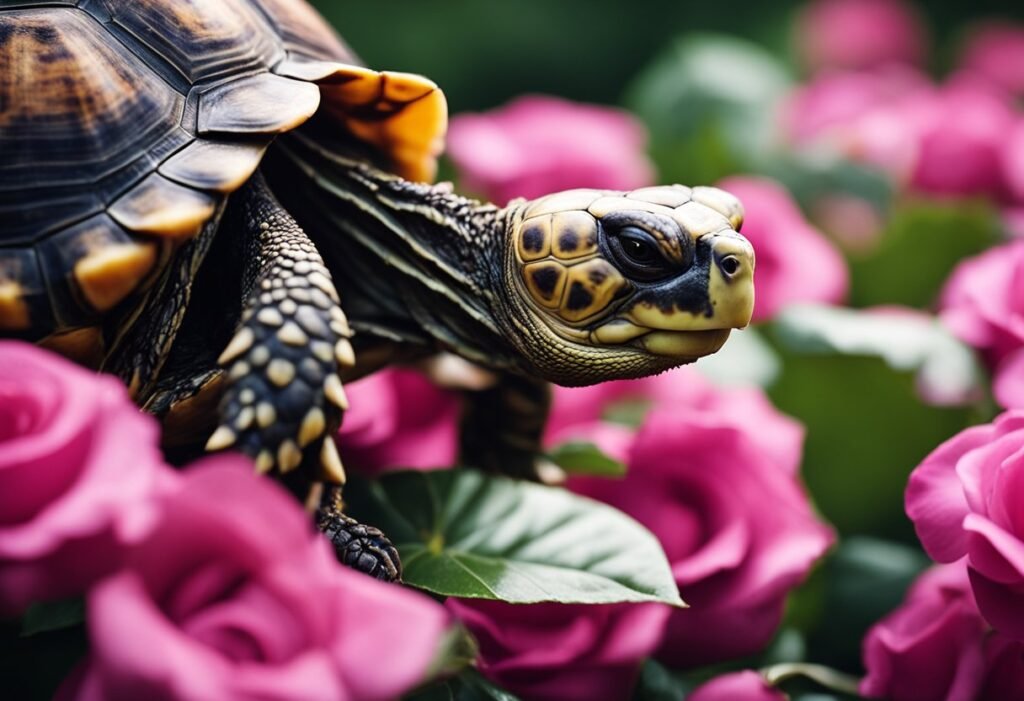
What vegetables can tortoises eat?
Tortoises are herbivores and require a diet that is high in fiber and low in protein. Some vegetables that are safe for tortoises to eat include kale, collard greens, mustard greens, dandelion greens, and turnip greens. It is important to avoid feeding tortoises vegetables that are high in oxalic acid, such as spinach and beet greens, as these can interfere with calcium absorption.
Can tortoises eat Comfrey?
No, tortoises should not be fed comfrey. Comfrey contains pyrrolizidine alkaloids which can be toxic to tortoises and cause liver damage.
Can tortoises eat Butterfly Bush?
No, butterfly bush should not be fed to tortoises. Butterfly bush contains coumarin, which can be toxic to tortoises and cause blood thinning.
Can tortoises eat Phlox?
No, phlox should not be fed to tortoises. Phlox contains saponins, which can be toxic to tortoises and cause gastrointestinal upset.
Can tortoises eat petunias?
No, petunias should not be fed to tortoises. Petunias contain solanine, which can be toxic to tortoises and cause gastrointestinal upset.
Are rose petals poisonous to eat?
No, rose petals are not poisonous to eat and can be fed to tortoises in moderation. However, it is important to make sure that the roses have not been treated with pesticides or other chemicals that could be harmful to the tortoise.

